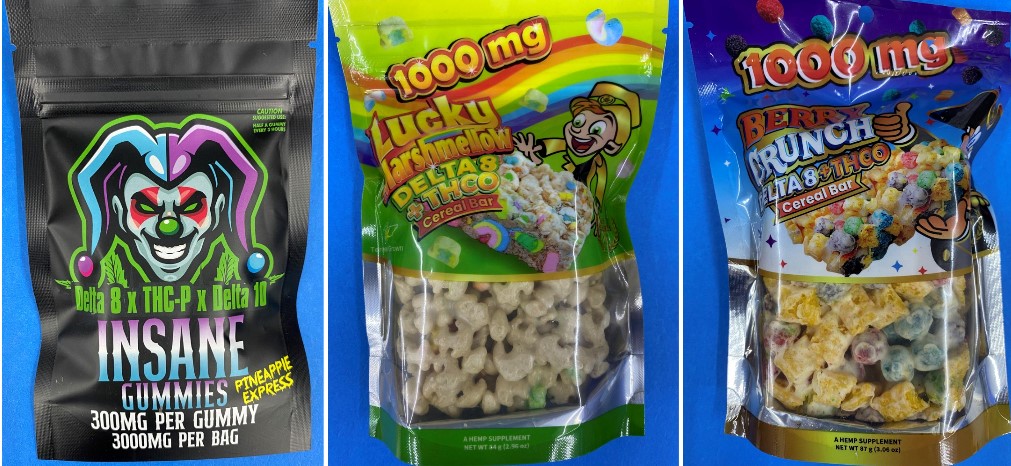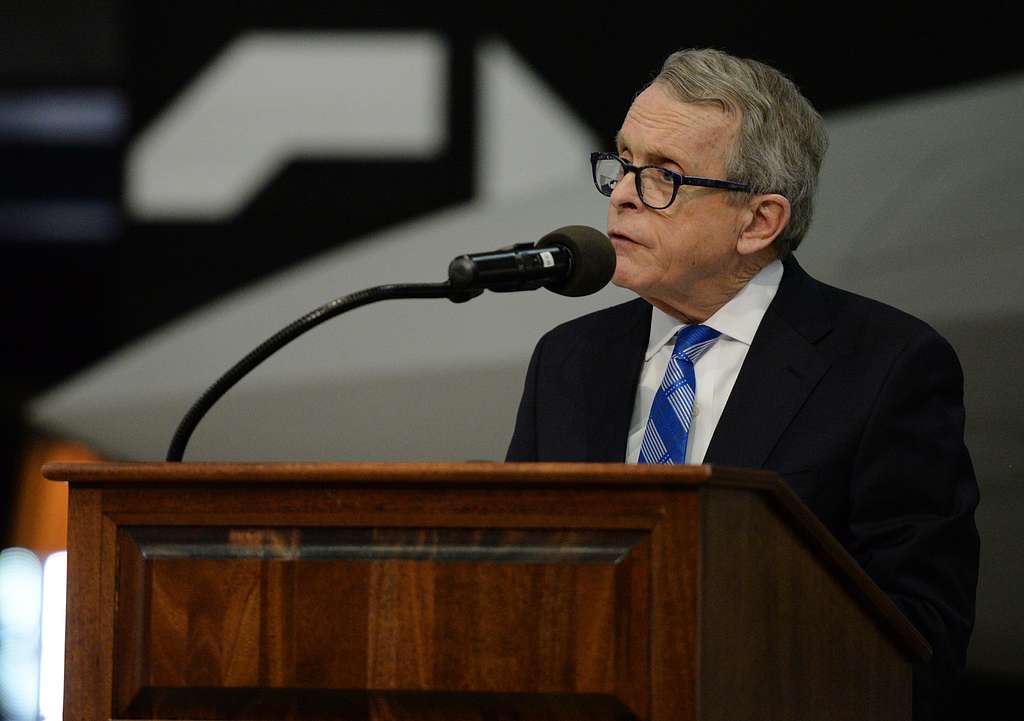The lack of rules for CBD and intoxicating hemp products continues to roil the industry, and sharp debate over policy is expected to continue until late this year following delay of the 2023 Farm Bill.
The final quarter of 2023 saw a flurry of legislative initiatives, regulatory updates and court cases as state and local officials across the country work to reign in the synthetically made, hemp-derived cannabinoids that produce a “high,” and which are not regulated by the Food & Drug Administration (FDA).
In the most recent development, Ohio Gov. Mike DeWine this week reaffirmed that he wants to see legislators move quickly to ban sales of the intoxicating hemp products, lamenting their wide availability in common retail outlets. DeWine said neither his office nor the police have laws under which they can crack down on the products.
Running wild
The products, such as delta-8 THC, HHC, THC-P and THC-O, have proliferated throughout the country, often marketed to youth in packaging that mimics well-known brands of snacks and candy. Also, many producers and sellers have received warnings from the FDA regarding the safety of their products. FDA said it has received reports of serious adverse events from consumers who suffered “hallucinations, vomiting, tremors, anxiety, dizziness, confusion, and loss of consciousness.” At least one child’s death in Virginia was attributed to delta-8 consumption.
The U.S. Drug Enforcement Administration considers the intoxicating hemp products to be federally illegal.
Some states continue to allow the products under a strict interpretation of federal law which legalized industrial hemp and its downstream derivatives. But other court rulings over the past two years have held that legalization of hemp in the 2018 Farm Bill never intended to allow intoxicating psychoactive products, which are made by manipulating hemp-derived CBD in the lab.
‘Hole to plug’
“They are buying it in gas stations around the state of Ohio. This is a hole that we have to plug,” Ohio’s DeWine told WLWT TV, Cincinnati.
“We have to make this illegal,” DeWine added. “We’re seeing kids get into cars under the influence of this stuff. And there’s no real regulation of it all. We’ve asked the legislature, and I’m asking them, again, give us the authority to stop this.”
Developments elsewhere, state-by-state:
Alaska: A ban on intoxicating products derived from hemp remains in effect after federal judge last week rejected a bid by a group of hemp stakeholders who had hoped to set aside enforcement of the policy. The court said it is unlikely the new rules are pre-empted by the Farm Bill of 2018, which legalized hemp federally. In November 2023, the Alaska Industrial Hemp Association and four businesses sued the state Department of Natural Resources (DNR), claiming that new limits on intoxicating hemp products are unconstitutional. The ruling means that virtually all hemp-derived product made or on sale in the state — drinks, gummies, cookies and more — remain illegal. The lawsuit stems from a regulation approved at the urging of the DNR which holds that the agency may not approve any products that do not have 0% THC.
Arkansas: A U.S. District Court in Little Rock ruled in October that a state law that banned delta-8 is in conflict with the 2018 U.S. Farm Bill, which removed hemp from the federal schedule of controlled substances. A group of growers, distributors and retailers mounted the legal challenge to the ban on constitutional grounds, filing against Arkansas officials including Gov. Sarah Huckabee Sanders and Attorney General Tim Griffin. The law at issue narrowed the definition of hemp “to recriminalize the possession, manufacturing, transportation, and shipment of certain popular hemp-derived cannabinoid products,” according to the plaintiffs’ lawsuit in U.S. District Court in Little Rock.
California: Late last year, a group of California cannabis companies filed suit against 10 competitors that sell hemp-derived delta-8 THC products, referencing a state ban on such products. Hemp retailers are selling edibles, vape cartridges and other products that contain more THC than what’s allowed at state-licensed cannabis stores, the plaintiffs allege. The defendants are accused in the lawsuit of having “brazenly flooded the California marketplace with these highly intoxicating and chemically synthesized Illegal Designer Drugs with the intention to evade and undermine California’s comprehensive system to control and regulate cannabis products.” The lawsuit names the following companies or brands: Binoid; Cali Extrax; Canably; Cutleaf Stores; Delta Extrax; Hazy Extrax; Savage Enterprises; 3C; Tre Wellness.
Georgia: The Georgia Court of Appeals in November found that hemp-derived delta-8 THC and delta-10 THC are not controlled substances under state law. The court ruled in favor of Elements Distribution, which challenged the state over a 2022 raid in which police seized about $2 million worth of psychoactive, hemp-derived products.
Kentucky: In November, a committee of Kentucky’s General Assembly approved emergency rules to regulate delta-8 THC and other intoxicating hemp-derived cannabinoid products. The Administrative Regulations Review Subcommittee said the rule aims to regulate products that are for adult use only. One new rule would require hemp products to have a ratio of 25 parts of a non-intoxicating cannabinoid such as CBD to one part intoxicating cannabinoids, such as THC, to avoid the adult designation.The rules also revise regulations for processing and manufacturing facilities, add product testing requirements, and require retail stores to register with the state. Stakeholders have urged officials to ultimately abandon the imposition of any ratio and set a limit of 2.5 milligrams THC per serving.
Maryland: A Circuit Court Judge in November temporarily suspended enforcement of a provision of the state’s cannabis law, alleging that restrictions in the law violate equal protection and anti-monopoly clauses in the Maryland Constitution. The law forced hemp and CBD shops to stop selling delta-8 and any other intoxicating hemp products that contain THC, limiting that business to marijuana sellers. State officials decried the marketing and packaging of such products that are targeted at children. The Maryland Hemp Coalition and a group of hemp businesses allege that the restrictions violate the state constitution.
Missouri: State lawmakers recently said they will try again to draft legislation prohibiting intoxicating hemp products in the state, citing ongoing safety risks due to their wide availability. The state Division of Cannabis Regulation (DCR) late last year revoked the marijuana manufacturing license of a state extractor for illegally importing marijuana from out-of-state sources which it sold along with Missouri-grown marijuana. The targeted company, Delta Extraction, argues that because hemp is legal federally, the state has no justification for blocking the products.
New York: In November, the New York Supreme Court issued a preliminary injunction against the emergency measures that abruptly halted the sale of hemp-derived THC-infused products in August. Stakeholders had criticized the state’s heavy-handed approach toward regulating the newly opened legal cannabis market.
Oklahoma: The Oklahoma Medical Marijuana Authority (OMMA) said in November that it plans to ask state lawmakers for the power to regulate hemp-derived products. OMMA said it does not intend to make intoxicating hemp-derived products illegal but wants to set rules and impose age restrictions. The agency said it was spurred to act based on complaints from Oklahoma consumers regarding the wide availability of the products.
Tennessee: New state rules approved by lawmakers in December made the Tennessee Department of Agriculture (TDA) responsible for regulating the hemp and marijuana industries in the state. TDA has established rules that are focused on cannabinoid profiles in raw flower products, setting new THC standards for THCA and CBD flower. The Tennessee Growers Coalition (TGC) said the regulations will not affect edible products but count cannabinoid content differently than the manner in which producers have been calculating levels for raw flower products over the last five years. TGC said the potential for disruption is significant because such products make up at least 70 percent of the market. The new law mandates TDA to manage an edible foods program from field to shelf. Included is a rule that cannabis products must be behind shelves in stores that cater to those under 21 years of age. Also, a new 6-percent tax on cannabis products was levied.
Texas: The state’s Third Court of Appeals set aside a ban on delta-8 and other THC isomers that the Department of State Health Services (DSHS) had designated as Schedule 1 controlled substances. The court said the ban conflicts with the 2018 U.S. Farm Bill. The debate over delta-8 in Texas has raged since at least 2021.

Products inspected by Virginia officials as part of a crackdown on intoxicating hemp edibles. (Photo: VDACS)
Virginia: A federal judge in October left rules in effect that carry stiff fines for Virginia businesses that continue to sell delta-8 and any other products that exceed total limits for all natural and synthetic forms of THC. A stakeholder group had filed the case. The rules, which remain in place, set strict limits on total THC levels in hemp food products such as gummies and other “candies.” The court ruled that the state had not overstepped its authority to regulate hemp in a way that conflicted with federal law nor interfered with interstate commerce, and had demonstrated that delta-8 THC is a credible threat to public health.
Wyoming: Lawmakers continue to work on a bill that would ban the addition of “synthetic substances” to hemp and would prohibit hemp products from containing more than 0.3% of any type of THC on a dry weight basis, including delta-8 THC and delta-10 THC. The measure defines “synthetic substances” as “any synthetic THC, synthetic cannabinoid or any other drug or psychoactive substance.” A draft of the bill passed a key legislative committee in November, but lawmakers said at the time that changes are needed to get it through both chambers of the legislature. The state already has a law on the books that outlaws delta-8 and delta-10 THC products, but a state Crime Lab expert has testified that there is no way to differentiate between synthetic and natural delta-8 compounds.

